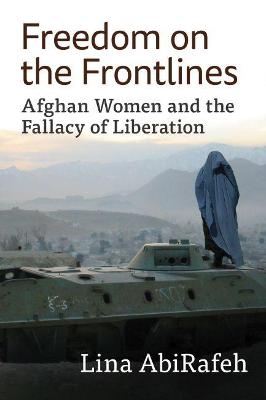
Freedom on the Frontlines
Afghan Women and the Fallacy of Liberation
Seiten
2022
McFarland & Co Inc (Verlag)
978-1-4766-8942-5 (ISBN)
McFarland & Co Inc (Verlag)
978-1-4766-8942-5 (ISBN)
Women’s rights in Afghanistan have been chipped away, and any gains - however tenuous - now appear lost. This book measures the rhetoric of liberation and details the crises and interventions that Afghani women have experienced over the twenty-year period from 2001 to 2021.
Afghan women were at the forefront of global agendas in late 2001, fueled by a mix of media coverage, humanitarian intervention and military operations. Calls for "liberating" Afghan women were widespread. Women's roles in Afghanistan have long been politically divisive, marked by struggles between modernization and tradition. Women, politics, and the state have always been intertwined in Afghanistan, and conflicts have been fueled by attempts to challenge or change women's status.
It may appear that we have come full circle twenty years later, in late 2021, when Afghanistan fell to the Taliban once more. Women's rights in Afghanistan have been stripped away, and any gains--however tenuous--now appear lost. Today, the country navigates both a humanitarian and a human rights crisis. This book measures the rhetoric of liberation and the physical and ideological occupations of Afghanistan over the twenty-year period from 2001 through 2021 through the voices, perspectives, and experiences of those who are implicated in this reality--Afghan women.
Afghan women were at the forefront of global agendas in late 2001, fueled by a mix of media coverage, humanitarian intervention and military operations. Calls for "liberating" Afghan women were widespread. Women's roles in Afghanistan have long been politically divisive, marked by struggles between modernization and tradition. Women, politics, and the state have always been intertwined in Afghanistan, and conflicts have been fueled by attempts to challenge or change women's status.
It may appear that we have come full circle twenty years later, in late 2021, when Afghanistan fell to the Taliban once more. Women's rights in Afghanistan have been stripped away, and any gains--however tenuous--now appear lost. Today, the country navigates both a humanitarian and a human rights crisis. This book measures the rhetoric of liberation and the physical and ideological occupations of Afghanistan over the twenty-year period from 2001 through 2021 through the voices, perspectives, and experiences of those who are implicated in this reality--Afghan women.
Lina AbiRafehis a global women’s rights expert, advisor and former aid worker with a decades-long track record in creating positive change for women in more than 20 countries around the world. She speaks and publishes frequently on her experiences. She lives in New York.
Table of Contents
Acknowledgments
Preface
Chapter 1. The Story of “Liberation” for Afghan Women
Chapter 2. Where We Fit Is Where We Fight
Chapter 3. The Honor of the Nation
Chapter 4. Aid as Liberation?
Chapter 5. Democracy as Liberation?
Chapter 6. War Has Never Been Over for Them
Chapter 7. At the Feminist Interface
Chapter 8. Women’s Agency and Resistance
Chapter 9. Freedom Is Only Won from the Inside
Dari Terminology
Acronyms and Abbreviations
Chapter Notes
Bibliography
Index
| Erscheinungsdatum | 06.03.2022 |
|---|---|
| Zusatzinfo | 48 photos, glossary, notes, bibliography, index |
| Verlagsort | Jefferson, NC |
| Sprache | englisch |
| Maße | 152 x 229 mm |
| Gewicht | 435 g |
| Themenwelt | Geschichte ► Teilgebiete der Geschichte ► Militärgeschichte |
| Sozialwissenschaften ► Politik / Verwaltung ► Europäische / Internationale Politik | |
| Sozialwissenschaften ► Soziologie ► Gender Studies | |
| ISBN-10 | 1-4766-8942-3 / 1476689423 |
| ISBN-13 | 978-1-4766-8942-5 / 9781476689425 |
| Zustand | Neuware |
| Haben Sie eine Frage zum Produkt? |
Mehr entdecken
aus dem Bereich
aus dem Bereich
neueste Manipulationstechniken als Waffengattung der NATO
Buch | Softcover (2023)
Westend (Verlag)
CHF 33,55


